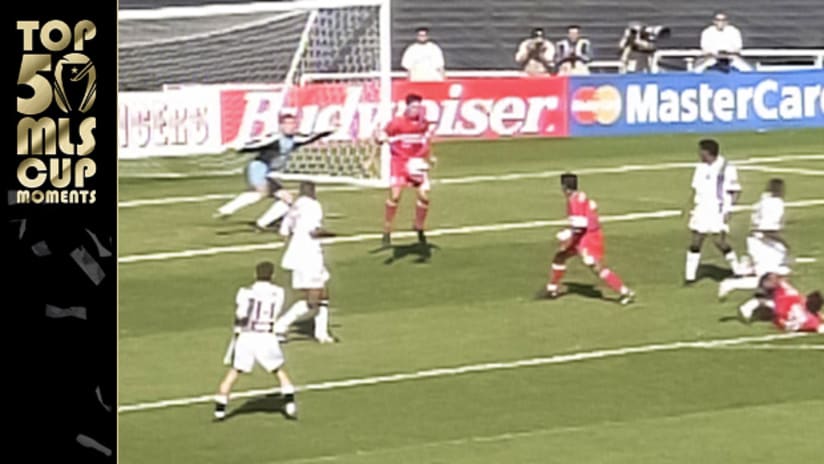<strong>Chicago 2</strong> |
<strong>D.C. United 0</strong> |
Podrbozny 29'<br>
Gutiérrez 45' |
<strong>Did You Know?</strong> |
Diego Gutiérrez played in 40 career postseason games in his 13-year career, but his only postseason goal came in the 1998 MLS Cup on a deflection. |
<span style="font-size: 12px;">Related Content</span> |
<ul><li><strong>WATCH: </strong><a href="//www.mlssoccer.com/videos?catid=1916&id=15960">Highlights from MLS Cup '98</a></li><li><strong>WATCH: </strong><a href="//www.youtube.com/watch?v=VCEXEgS4ze0">Fire do double in 1998</a></li><li><a href="http://www.soccertimes.com/usteams/1998/oct27.htm">Arena leaves D.C. after MLS Cup '98</a></li></ul> |
What was the best Chicago Fire team of all-time?
#35. Passive Interference? (1998)
Consider just some of the names who suited up in MLS Cup 1998, and it’s bizarre to think that Kevin Terry might be the one some believe had the biggest effect on the outcome of the match.
That's because one of the most star-studded finals in league history may have hinged on a controversial play late in the first half that still stirs some sick feelings in the nation’s capital.
Here’s the scene. The Chicago Fire are leading 1-0 over D.C. United in the 45th minute when a lightning-quick Fire counterattack puts D.C. on their heels. Fire great Peter Nowak takes a feed from Chris Armas and cuts inside from the left wing and into the D.C. box, but United goalkeeper Tom Presthus has Nowak’s shot sniffed out from the get go.
“I had a good sight on the ball, I could tell Peter was going to try and curl it to my left,” Presthus said. “I made a move that way, and as soon as I did, the next thing I saw, it got deflected and it was in the other side of the goal.”
That deflection came off Diego Gutiérrez, who found himself on the right end of fate and wildly celebrating a sudden 2-0 Fire lead.
But there was a problem. Assistant referee Laszlo Nagy’s flag was in the air, calling out Fire forward Ante Razov for offside and leaving head referee Terry with a split-second decision to make.
It wasn’t whether Razov was in an offside position; he clearly was, maybe a yard or two in front of Presthus in the box. But had he played any factor in the goal?
“I felt Ante was jumping out of the way of the ball to let it go through, because it still had good pace on it, and the ball goes straight into the back of the net,” Terry said. “I’m looking at it from my angle. The assistant referee had his flag up for offside, but as the referee, it was my decision to let the goal stand. That’s the split decision — Ante Razov did not have any factor in that ball going into the back of the net.”
The goal itself didn’t necessarily change the game for good, but it did give the Fire a huge boost in momentum heading into the halftime break.
“It was a very important goal because D.C. was really trying to push the game forward, and we’d been defending for quite some time,” Nowak said. “And that goal from the counter we had gave us a comfortable lead going into halftime.
“We didn’t have too many scoring chances in the second half, so the second goal actually gave us the confidence that we could win the Cup.”
Presthus, meanwhile, was mistakenly under fire from the crew in the television booth, who had saddled him with the blame for the Fire’s 2-0 halftime lead.
“I remember [head coach Bruce Arena] coming up to me before we walked into the tunnel, and he was asking me if the guys were offside on both goals,” Presthus said. “And I said, ‘Yeah! For sure!’ But the commentary on the television was something like, ‘Well, you can see Bruce really laying into Tom about his performance!’ But that totally wasn’t the case.”
The Fire held on for the 2-0 win and what still stands as their only MLS Cup in franchise history. Terry’s fateful call may be one of the signature moments of that game, and still one that he remembers well after a long career as a referee, including a return to officiate MLS Cup in 2002.
“At that time, I took a huge amount of heat for it during the game and postgame,” he said. “The coaches and players were upset with my decision. I took a lot of heat from U.S. Soccer for allowing the decision. It was one of the downest moments for me in the game.”
How controversial was the call? Enough so that it became a point of emphasis and instruction when US Soccer met with MLS clubs ahead of the following season. The USSF reps dropped a bomb on Presthus and his D.C. teammates.
“They showed the video, and it must have been from Germany or something, because they had it sent over to get analyzed with all these 360-degree views, technology that was cutting edge at the time,” Presthus said. “And in both [including Jerzy Podbrozny’s 29th-minute goal], the players were offside and should have been disallowed. So we’re sitting there in the room and they tell us those goals shouldn’t have counted, and we start cheering and high-fiving and yelling, ‘We won! We won!’
“But of course,” Presthus lamented, “that wasn’t the case.”
As for Terry, he stands by the call that made him a lightning rod for controversy on that day, and one that helped Chicago claim the Cup. The interpretation of interference has evolved over the years to allow more leeway for attackers in a similar position to Razov’s, and a similar play today perhaps wouldn’t create the controversy it did in 1998.
“I still stick by that decision in this moment now because [the interpretation] has changed over the years,” he said. “Maybe I was ahead of my time at the time I made the call. That same play today stands as a goal. ... I didn’t feel that Ante was interfering.”














